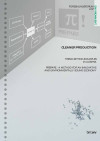Suchergebnisse
Cleaner Production

Trend-setting examples in Austria PREPARE a method for an innovative and environmentally sound economy
Forschungsforum
4/1997
Herausgeber: BMVIT
Englisch, 6 Seiten
Downloads zur Publikation
Material utilization of end-of-term textiles
Mechanical processing of the non-reusable part of collected end-of-life apparels (e.g. cutting, sifting, etc.); development of marketable application for the obtained short fibers in the field of construction materials (e.g. bitumen modification)
Secondary Materials in the Austrian Textile Industry - Study with Recommendations for the Austrian R&D-Politics
This study deals with the challenges and potentials for the use of secondary materials in the Austrian textile industry. It identifies challenges and potentials for establishing cycles in the textile industry with a focus on the use of secondary materials in Austria based on broad stakeholder involvement. Based on this, recommendations for research and development activities were formulated to promote recycling.
The Paper Factory in the Year 2030
Paper factory in the year 2030 as an integrated part of a sustainable economy and a supplier of sustainable paper products fulfilling criteria for sustainability at highest possible level.
ZERIA 3 (Zero Emissions Research in Application)
Elaboration of the principles for zero emission enterprises. The results show that this approach can be realistic and economically advantageous in many cases.
S I P settlement models in passive house quality
Research, development and realization of integral building concepts in passive house quality!
Urban Future - "Resource Efficient City of Tomorrow"
Challenges fort he cities of tomorrow with research issues referring to resource management, efficiency and technology development
Improvement of resource efficient use of wood
Modelling of wood processing in order to demonstrate the developments' impacts on performance
RAINBOW 2
Application and expansion of knowledge gained in the project Rainbow1 for the production of new, functionalised fibres using renewable resources as well as other fibre manufacturing methods in a pilot plant scale production.
PolyBacTex - Converting mixed textile waste into recycled fibres and cellulose for sustainable production
The project PolyBacTex is developing a solution for recycling of used mixed textiles by chemically separating and biotechnologically upgrading the individual fibre types (cellulose and polyester). This allows cellulose fibres to be recovered and returned to the fibre production process.
Scenarios for the Biobased Industry in Austria
In order to support the implementation of the Austrian Bioeconomy Strategy, three scenarios for the bio-based industry in Austria were developed. The present study is intended to serve as a solid overview and as a starting point for further detailed studies by other researchers.
StraTex ‐ Sorting and processing strategies for used textiles to produce recyclable fractions
In StraTex, suitable, economically viable and holistic strategies for the collection, processing and automated sorting of mixed non‐reusable textiles are being developed and experimentally implemented in order to increase the proportion of marketable fractions for high‐quality material recycling (preferably fibre2fibre).
Repair initiatives in Europe: innovations, business models, recommendations. Experiences from the PREPARE network
The European Union and many countries in Europe have begun to take individual measures to-wards “increasing the repair rate” here and there. With the help of surveys and interviews, which were carried out with the support of contacts provided by the “PREPARE” network, which has ex-isted for almost 30 years, this work collects information about such measures in other European countries - especially regarding “best practice examples” and “lessons learned” – and analyzes their transferability to Austria.
Product Service Systems Water
Based on former FdZ projects in the area of PSS, EMA and Zero Emission PSS Water develops and realises a guideline with which sustainable water management in industry and public utiliies as a service can be offered.
Multifunctional City Nucleus
Sustainable mixed-use utilization of urban commercial and industrial areas with a specific focus on energy-related aspects.
Carless Tourism In Austria

The valleybus project Lungau, Murau, Nockgebiet - an innovative pilot scheme
Forschungsforum
3/1995
Herausgeber: BMVIT
Englisch, 6 Seiten
Energy Workshop Northern Waldviertel

A local " integrated" energy program - successful implementation through research cooperation
Forschungsforum
1/1996
Herausgeber: BMVIT
Englisch, 6 Seiten
ZERMET - Zero Emission Retrofitting For Existing Textile Plants
Minimisation of the consumption of water, chemicals and energy in the textile industry. Further development of the ZERMEG approach in the form of a questionnaire and application in the textile industry.
Chemistry, process design and sustainable economic development
The results of this project were to deliver the basics for chemical process engineering taking into account the requirements of sustainable development. The proposed results will have to be in conformity with ecological, economic and social requirements for sustainability. Hence the processes will mostly be based on renewable resources.
New potentials using hardwood with small diameters in forestry and timber industry
Identification of potentials to use hardwood with small diameters (SDH) in Austria with the help of the value added chain from the forest's location to the processor. Analysis and evaluation of availability, quality and market potential.
